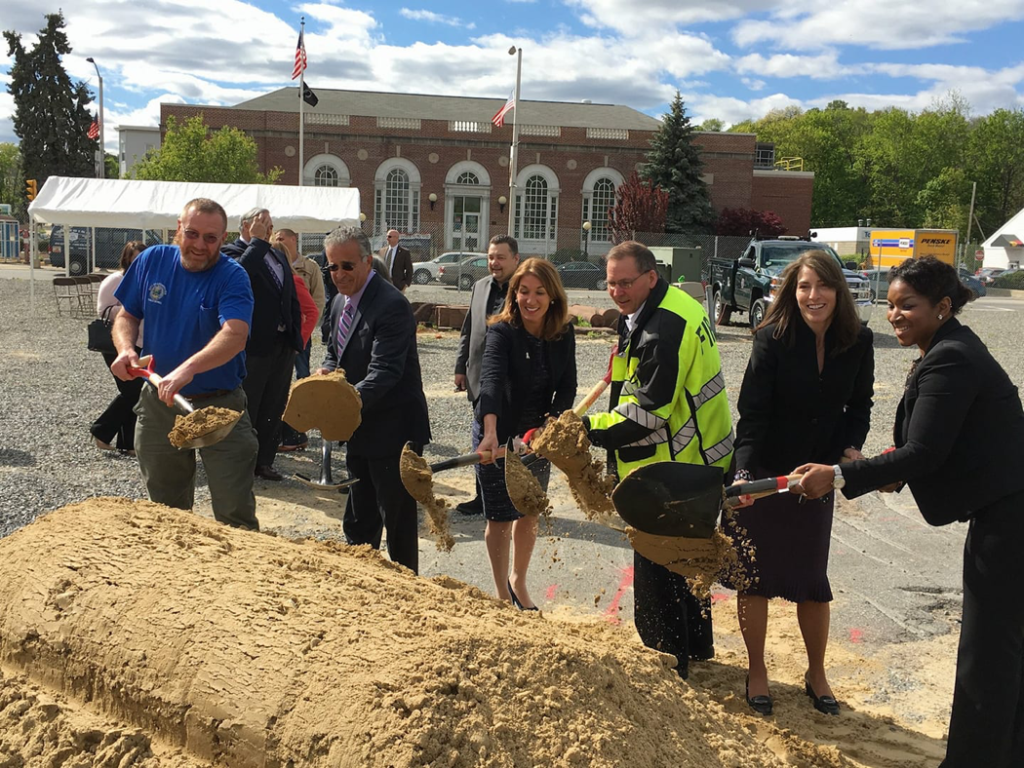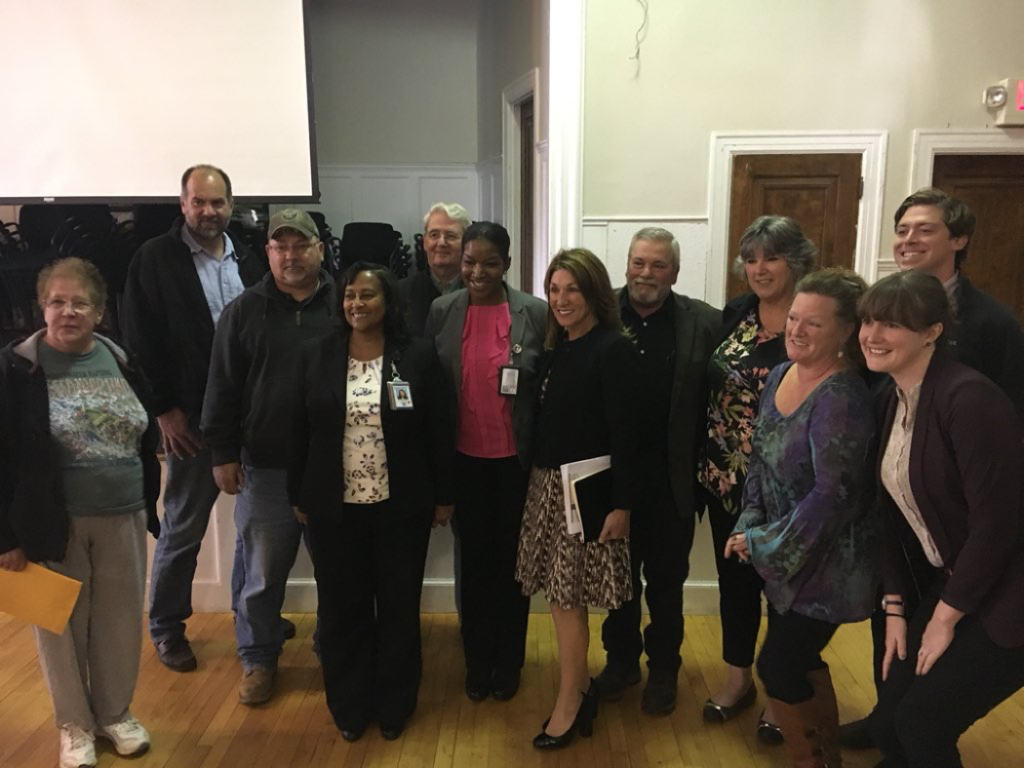^ Jacquie Furtado (standing, right) presents at the 2017 SmartGrowth Alliance Conference. Photo courtesy of Grow Smart MA.
Since this blog launched in September 2017, we have been on a quest to highlight the work of UEP’s current students, faculty, and alumni who are fulfilling the mission of becoming #PracticalVisionaries. Some folks approach us themselves, others we hear about in the news, and others are recommended for their stellar work. In the case of Jacquie Furtado, MA ’13, I was forcefully told by a previous interviewee, community noise researcher Erica Walker, that I had to contact her UEP classmate Jacquie about the work she’s done since leaving Tufts. Below, you’ll find a fascinating account of Jacquie’s current work at the MassWorks Infrastructure Program, a project of the Commonwealth’s Executive Office of Economic Development. Her work there sits at the intersection of many planning fields: housing, sustainable development, transportation infrastructure, community planning, water systems management, and more. Read on to find how Jacquie is navigating and thriving in this challenging role:
Tell me about your work with the Massworks Infrastructure Program, and how infrastructure investments support economic development and job creation.
The MassWorks Infrastructure Program provides a one-stop shop for municipalities and other eligible public entities seeking funding to support housing, economic development and job creation. In addition, the Program supports municipalities with a population of 7,000 or less that may seek grants for roadway improvements to enhance public safety.
I’m responsible for project management functions for the Community Planning and Resources Office (CPRO) to implement the economic development and housing production goals outlined in the Commonwealth of Massachusetts Economic Development Plan. I’m mainly responsible for working as part of the CPRO team to facilitate the performance of the Commonwealth’s Sustainable Development Principles. I represent our office by interacting directly with municipalities, other state agencies and quasi-governmental entities, as well as public/private stakeholders and community-based organizations.
Additionally, I contribute to the oversight of the MassWorks Infrastructure Program by facilitating the grant making process and serving as contract manager for 40-50 grantees in assigned regions of the state. It should be noted that our processes for selecting infrastructure projects across the state are aligned with the Office for Commonwealth’s Sustainable Development Principles. For example, one main focus is on job creation and affordable housing. Thus, we recommend infrastructure projects and encourage housing development that is consistent with smart growth, sustainable design and green building practices.
How do the projects you work on differ between urban, suburban, and rural municipalities?
The MassWorks Infrastructure Program provides infrastructure grants for work including, but not limited to: sewers, utility extensions, streets, roads, traffic signalization, curb-cuts, parking facilities, site preparation and improvements on publicly owned land, demolition, pedestrian walkways, and water treatment systems. These smaller grants support the following project types within larger cities/towns and gateway cities:
- Multi-family housing development at a density of at least 4 units to the acre (both market and affordable units)
- Economic development in weak or distressed areas
- Community revitalization to promote mixed-use development
And then, as per MGL c.23A, s6(e), 10% of funding is set aside for small, rural communities which used to apply for funding under the Small Town Rural Assistance Program (STRAP) prior to it being consolidated into the MassWorks Infrastructure Program. These towns have a population of 7000 or less and would normally not have the means and/or resources to compete with such larger cities & towns. Thus, STRAP communities can therefore apply for road and transportation improvements to enhance safety in their communities. Per statute, the award cannot exceed $1,000,000 per every 3 years.

A groundbreaking in Leominster held on 5/11/17. Photo courtesy of Lt. Governor Karyn Polito’s Twitter page @ MassLtGov. The Town of Leominster was awarded a 2016 MassWorks grant in the amount of $2.5 million to complete infrastructure in the downtown. The MassWorks infrastructure funding will support downtown housing development, including the redevelopment of the former W.S. Reed Toy Company mill into 36 units of market-rate housing.
How did your experience at Tufts prepare you for this work? Anything you got out of UEP that has helped with managing projects and facilitating collaboration around economic development and housing production?
In my Master’s program, I focused mainly on child and family (social) policy with attempting to better understand anti-poverty initiatives from that angle. Shortly after graduation, I began working in human service organizations and realized that although my efforts were genuine, my work was not fulfilling. I felt as though I was applying Band-Aids to real social problems as opposed to getting at the root. As both an ERSEA Specialist at Action for Boston Community Development, Inc. and as an Enrollment Specialist at Tri-City Community Action Program, I was responsible for determining initial eligibility as well as the complete and accurate collection, entry, reporting and maintenance of data, records and reports related to the enrollment application and ERSEA (eligibility, recruitment, selection, enrollment and attendance) policies and procedures for low-income children and families within the Head Start program. Very rewarding work overall but again, I wanted to go deeper. How could I help to mitigate socially debilitating problems that my clients were experiencing?
My experience working with community-based, public organizations committed to the economic empowerment of under-served, diverse populations have well-equipped me with competencies and expertise that qualified me as the ideal candidate for my current position in the Executive Office of Housing and Economic Development. I had enough knowledge to navigate my new position from the onset but continuously sought my former UEP professors for consultation.
Then, to my great joy and career advantage, the Certificate for Advanced Graduate Studies (C.A.G.S.) in social justice and sustainability was born. Professor Justin Hollander recommended that I look into the program as he felt it would enhance my skills and benefit my current position. My manager provided the recommendation that I needed to be considered for the program as he also saw the benefits for our work.
As for facilitating collaboration around economic development and housing production, I would definitely like to give a “shout out” (or silent nod?) to our Field Projects assignment. While my team focused specifically on child welfare policy, there is some merit in our collaborating with various child welfare agencies across four states in addition to working with a major child organization in yet another state to produce a deliverable desirable and useful for all. So yes, Field Projects is definitely a useful component of the UEP program if anyone was wondering (smile). Additionally, my thesis project was yet another form of “practice”. In sum, from my UEP experience, I have managed large and complex projects in which I gained excellent project management skills that are adaptable across all service industries.
Tell me about one or two of your favorite projects you’ve worked on so far.
By far, it has to be a project that we just awarded in our 2017 grant round. A 425,000 MassWorks award went to the City of Pittsfield for the Gordon-Deming Infrastructure Project. The grant will leverage $780,000 in private funding for an affordable housing project.
The Gordon-Deming Infrastructure Project will construct the necessary access road and infrastructure in support of 6 units of affordable condominiums proposed in the Gordon-Deming Housing Development by Central Berkshire Habitat for Humanity. The project supports the city’s community objective to increase its affordable housing stock. In addition, the units are designed for aging in place which addresses another community concern and goal. While we have not yet contracted with the city, I am eager to see this one to the end.
Additionally, there is a project that precedes my time with MassWorks. In 2014, the Town of Mashpee was awarded a $925,000 MassWorks infrastructure award for Mashpee Commons, which is a certified Growth Center for the Town of Mashpee, designed and built using Smart Growth principles. The $901,250 MassWorks award extended Market Street from its original terminus in Mashpee Commons, southward to Job’s Fishing Road allowing for the development of residential and mixed-use buildings along either side. The private development project is proposed for build-out over a number of phases, as part of a large-scale master plan to complement and enhance the existing Mashpee Commons. Part of a permitted 382 unit 40B development, the first phase included 53 housing units and approximately 12,000 sf of retail. The project was consistent with Cape Cod Commission’s Regional Planning efforts and was an ideal sustainable housing project in my opinion.
Why is it sustainable housing? As we spread ourselves further and further apart via suburban living, commutes have gotten longer and longer, health negatively affected, and relationships strained. Then with shifting demographics, there is no longer a need for large houses in the suburbs as the number of single-person households is at a record high and still rapidly growing. As in, the newest generations are not even having families to fill up the large houses (baby boomers remain in the suburbs but they are aging out).
Ellen Dunham-Jones in her “Retrofitting Surburbia” TED Talk, spoke on the overall concept of retrofitting suburban and rural spaces by way of dramatic redevelopment projects where whole buildings are razed then rebuilt at a significantly greater density…think, “compact, walkable urban neighborhoods.” However, she noted that there are projects that are much more incremental. Such as Mashpee Commons, the oldest retrofit found by Dunham-Jones. In the TED Talk, she refers to different maps showing the old 60’s strip shopping center in comparison to its gradual transformation into a compact, mixed-use New England village.

2017 MassWorks Infrastructure Award Announcement/Site Visit in the Town of Chester with the Lt. Governor, MassDOT & the Pioneer Valley Planning Commission (PVPC). Photo courtesy of Lt. Governor Karyn Polito’s Twitter page @ MassLtGov. The Town of Chester received a $1,000,000 MassWorks award for the East River Road Resurrection Project. MassWorks funds will address extensive damages to East River Road, including severe cracking, deteriorated edges and dangerous potholes. The MassWorks grant is leveraging $30,000 in local chapter 90 funding the Town has committed towards design and engineering.
What are the biggest challenges and barriers to achieving the goals of the Commonwealth of Massachusetts Economic Development Plan?
The biggest challenges lie in the fact that we are a home rule state with multiple forms of government spanning across our 351 cities/towns. Part of my responsibilities in recommending infrastructure projects for funding is first analyzing the economic feasibility of community plans and their adherence to the Commonwealth’s Sustainable Development Principles. This process can be cumbersome because grant programs cannot be tailored to a community’s needs but rather, they encourage communities to meet a certain standard or ideal. It’s painstaking to witness a great project be tabled simply because a community refused to think outside of the box or not look to their neighboring cities/towns to collaborate on infrastructure and/or development projects and produce multiple public benefits. This is especially so for communities that lack water and sewer infrastructure and are more dependent on wastewater treatment plants and septic systems.
